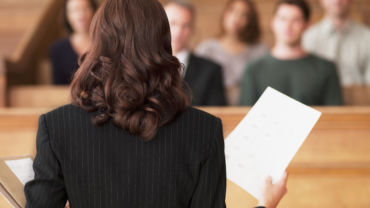Thomson Reuters Legal Insights Europe
17 Dec 2021
Image Credit: REUTERS/John Sibley
The impacts of the pandemic have been felt by us all. But one of the little publicised areas that continues to work tirelessly, and did so throughout the last 18 months, is our criminal justice system. We had the opportunity to speak with HHJ Lucraft QC, the Recorder of London, about COVID-19 and technology, and his own opinions and the possible impacts he has felt and seen.
-
What do you think are some of the benefits or quick-wins that could be expected with a more digital approach to the criminal justice system? Where are we now and is there an obvious direction of travel?
One of the big changes with CVP (cloud video platform) is that we can make sure that the trial advocates are able to ‘attend’ pre-trial hearings where they might otherwise have to get someone to attend in their place. Whilst for many substantive hearings we have at the Old Bailey we will need to have all parties present, the use of technology does help with many short pre-trial hearings.
-
Should there be any role for artificial intelligence and machine learning in the determination of guilt or innocence?
In my view no. Criminal trials sometimes involve subtle and nuanced defences – self-defence and honesty/dishonesty for example, and those fine judgments are best made by a jury made up of a random selection from the public. If guilty, many people will serve significant sentences (in Old Bailey cases) and I much prefer to rely on real humans to make those calls than any form of AI.
-
Should the jury remain at the heart of the criminal justice system in a streamlined digital process or is there a case for juries being retained only in relation to a limited class of cases?
I am very keen that we keep the jury at the heart of the criminal process. I would not want to see virtual juries or any dilution of a tried and tested system. There are many moving parts to a criminal trial, but judge and jury sitting in the same courtroom to hear the trials are vital.
4. What has changed for you over the past year – what has worked and not worked in courts over the past year, and what do you think will remain moving forward?
For me personally, a lot has changed in the last 12 months. This time last year I was holding two key judicial roles: Chief Coroner of England & Wales and Recorder of London. Both have been taxing because of the on-going impact of the pandemic. Since Christmas Eve 2020 I have only had one role to perform as Recorder of London. The City of London events have restarted over the last 6 months and it has been good to see more people in and around the City. In courts, we have continued to use every inch of available space, and we will continue to do so. Just before the latest variant struck, we were looking to increase our capacity at this court. I hope we will still be able to do so from March 2022 onwards, but we will have to see.
What has worked well for us is having dedicated jury deliberation space and putting the jury for a case in that space throughout a trial. It cuts down risks of cross-contamination and also means that retirements to consider verdicts can be shorter as the jury have had more chance to bond in the course of a trial.
I am sure the IT kit we have will remain being used more extensively after the pandemic – particularly for links between courts and prisons.
5. In your view, what is the impact of people not meeting outside the courtroom door?
I think one of the key downsides of not having all parties in all cases at court is the ability for people to meet and talk about cases and experiences. I am concerned for junior members of the Bar as mixing, talking with colleagues, sharing experiences at courts is a vital way of learning. Our senior practitioners and judges will have to come from somewhere and if we have lost significant junior members, then that is a real concern.



